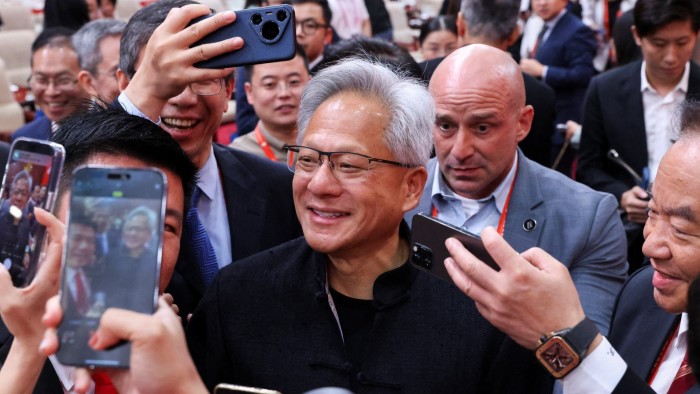Unlock the Editor’s Digest for free
Roula Khalaf, Editor of the FT, selects her favourite stories in this weekly newsletter.
Nvidia chief Jensen Huang said it would “accelerate the recovery” of its China sales, after a détente between Beijing and Washington allowed the leading AI chipmaker to resume shipments of a key processor specifically designed for the Chinese market.
Huang told a press conference in the Chinese capital on Wednesday that the company had not yet received export licences from Washington to restart shipments of its H20 product, but he expected them “to come through very shortly”.
Nvidia had reported a $4.5bn writedown in its April quarter, as the Trump administration tightened export restrictions on advanced chips and it was left with a huge H20 inventory it could no longer ship.
“Some of what we wrote off is hard to recover, but what we put on reserve will not be scrapped permanently,” he said on Wednesday.
The company would make a final decision about whether it needed to restart production of its previous Hopper generation, of which the H20 was part, once customer orders came through, he said.
“The customers’ old orders have been cancelled. Their demands may have changed. We have to start the supply chain,” he added, noting that the process takes nine months.
Huang had earlier met government officials and delivered a speech at a supply chain conference in the capital, where he praised China’s manufacturing prowess and advancements in AI made by companies such as DeepSeek and Alibaba.
Huang’s trip to Beijing comes after the company received assurances from the Trump administration that it would approve licences for its H20 chip, in a dramatic reversal of the April ban on exporting its dedicated AI product for China.
Commerce secretary Howard Lutnick said on Tuesday that Washington’s policy change had been part of recent trade talks between American and Chinese negotiators in London and Geneva.
“I went to DC one week ago and I told Trump and his cabinet I was coming to China. He said: ‘Have a good trip’,” Huang told Wednesday’s press conference.
“I did not change the president’s mind . . . it was completely in control of the US government and Chinese government discussions,” he said.
“Export controls as a pillar of national security and as a regime for global exchange are here.”
The approval to resume shipments is a significant win for Nvidia and comes after an intense lobbying campaign by Huang in Washington, during which he warned that the US risked ceding its leadership in artificial intelligence to Chinese companies, such as Huawei, if American companies could no longer ship hardware to the country.
Nvidia also announced a new China-specific graphics processing unit (GPU) on Tuesday that it said was fully compliant with current export controls. Last week, the Financial Times reported that Nvidia planned to release an updated China chip, based on its Blackwell RTX Pro 6000 processor.
Huang said on Wednesday the new chip was well suited to automated manufacturing.
Stacy Rasgon, senior analyst at Bernstein covering the US chip industry, said the pivot by the White House would allow “Nvidia to compete in China” and “preserve their ecosystem advantages”. He noted that the policy reversal would boost the chipmaker’s profitability through to next year.
“Jensen has been carefully cultivating Trump and members of the administration, as well as clearly laying out the risks of maintaining the ban,” he added.
Even though the H20’s performance has been throttled and it faces competition from local rivals, Chinese internet companies are still expected to be eager customers, given their reliance on Nvidia’s Cuda software and the need to meet rising demand for running AI workloads.
Jefferies analysts wrote that the relaxation of export restrictions would mean “improved sentiment” for major players, including Alibaba, Tencent and Baidu, as more companies accelerated AI adoption across a range of industries. Fresh GPU supplies would enable them to capitalise on the growing demand for more computing power.
“Customers across different sectors are adopting AI — not only internet, fintech, education and EV — but also sectors such as manufacturing, which need to use AI and migrate to [the] cloud,” wrote equity analyst Thomas Chong.



